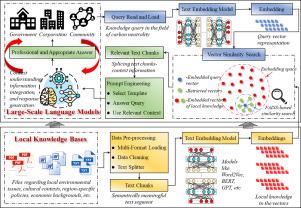Integrating local knowledge with ChatGPT-like large-scale language models for enhanced societal comprehension of carbon neutrality
IF 9.6
Q1 COMPUTER SCIENCE, ARTIFICIAL INTELLIGENCE
引用次数: 0
Abstract
Addressing carbon neutrality presents a multifaceted challenge, necessitating collaboration across various disciplines, fields, and societal stakeholders. With the increasing urgency to mitigate climate change, there is a crucial need for innovative approaches in communication and education to enhance societal understanding and engagement. Large-scale language models like ChatGPT emerge as transformative tools in the AI era, offering potential to revolutionize how we approach economic, technological, social, and environmental issues of achieving carbon neutrality. However, the full potential of these models in carbon neutrality is yet to be realized, hindered by limitations in providing detailed, localized, and expert-level insights across an expansive spectrum of subjects. To bridge these gaps, this paper introduces an innovative framework that integrates local knowledge with LLMs, aiming to markedly enhance the depth, accuracy, and regional relevance of the information provided. The effectiveness of this framework is examined from government, corporations, and community perspectives. The integration of local knowledge with LLMs not only enriches the AI’s comprehension of local specificities but also guarantees an up-to-date information that is crucial for addressing the specific concerns and questions about carbon neutrality raised by a broad array of stakeholders. Overall, the proposed framework showcases significant potential in enhancing societal comprehension and participation towards carbon neutrality.

将地方知识与类似 ChatGPT 的大规模语言模型相结合,提高社会对碳中和的理解能力
解决碳中和问题是一个多方面的挑战,需要不同学科、领域和社会利益相关方的合作。随着减缓气候变化的紧迫性与日俱增,亟需在交流和教育方面采取创新方法,以加强社会的理解和参与。像 ChatGPT 这样的大规模语言模型作为人工智能时代的变革性工具应运而生,有望彻底改变我们处理实现碳中和的经济、技术、社会和环境问题的方式。然而,这些模型在实现碳中和方面的全部潜力还有待发挥,其局限性在于无法在广泛的主题范围内提供详细、本地化和专家级的见解。为了弥补这些不足,本文介绍了一个创新框架,该框架将本地知识与本地土地利用模型相结合,旨在显著提高所提供信息的深度、准确性和区域相关性。本文从政府、企业和社区的角度探讨了这一框架的有效性。将本地知识与当地法律信息结合起来,不仅能丰富人工智能对当地特殊性的理解,还能确保提供最新信息,而这些信息对于解决广大利益相关者提出的有关碳中和的具体关切和问题至关重要。总之,建议的框架在加强社会对碳中和的理解和参与方面展示了巨大的潜力。
本文章由计算机程序翻译,如有差异,请以英文原文为准。
求助全文
约1分钟内获得全文
求助全文
来源期刊

Energy and AI
Engineering-Engineering (miscellaneous)
CiteScore
16.50
自引率
0.00%
发文量
64
审稿时长
56 days
 求助内容:
求助内容: 应助结果提醒方式:
应助结果提醒方式:


